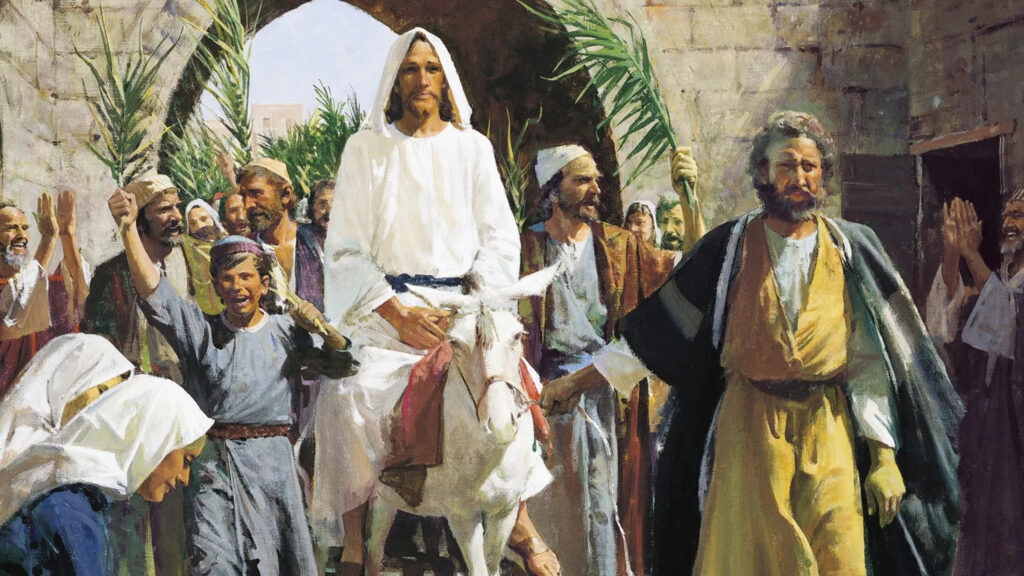14 April 2025
God’s promises are not dependent on our plans working out, all we need is His presence. “Hosanna” in joy and “Hosanna” in hardship.
Palm Sunday invites us to reflect on Jesus’ entry into Jerusalem, a moment marked by both celebration and sorrow. John 12:12 recounts the excited crowd greeting Jesus with palm branches and shouts of “Hosanna!”, hailing Him as the Messiah. This was a fulfillment of regional custom, where kings entered on donkeys as symbols of peace, and the laying of palms signified victory and recognition.

The people’s “Hosanna” was a fervent expression of hope for political and military liberation, believing God’s promise was about to be realized according to their expectations.
However, Luke 19:41 reveals Jesus’ tearful response upon seeing the city. While they praised, He wept, foreseeing Jerusalem’s destruction and their blindness to His true mission. Their understanding of peace and salvation was limited to earthly deliverance.
As Phillip Yancey noted, the “Hosanna” of one week would become “Crucify Him!” the next, because their praise was contingent on Jesus fulfilling their preconceived notions of victory.
Jesus’ mission was not to save them from Roman rule but from death, offering eternal life. Often, our passionate worship is tied to the belief that God is aligning with our plans. But Isaiah 55:8-9 reminds us that God’s thoughts and ways are far beyond our own. Tim Keller’s insight that God gives us what we ask or what we would ask if we knew all He knows, highlights the limitations of our perspective. Jesus wept because their praise was based on a misunderstanding that would lead to rejection when His true, greater purpose unfolded.
We can also fall into this trap, where our “Hallelujah” is conditional. We must be careful not to confine God’s promises to our personal context. A setback in our plans doesn’t equate to a failure of God’s promises; it may simply indicate His higher ways at work (Proverbs 19:21). True faith allows us to sing “Hosanna” even in hardship.
Paul’s instruction in 1 Thessalonians 5:16-18 to rejoice always and give thanks in every situation points to God’s will for us, even amidst broken plans. Praise invites God’s presence into these difficult places. Jesus promised His presence, not the guarantee of our plans succeeding. The people rejected Him because His actions didn’t meet their expectations, missing the greater gift of His presence.
Paul’s experience in prison demonstrates the power of praise to invite God’s presence into seemingly hopeless situations. Had the people of Jerusalem maintained their “Hosanna,” even when Jesus’ path differed from their expectations, history might have unfolded differently.
God’s promises are not dependent on our plans working out; all we need is His presence. “Hosanna” in joy and “Hosanna” in hardship.
Reflect:
- Where in your life have you turned to God in disappointment because of plans that didn’t work out saying, “But God, you promised!”
- Where have you felt that the expectation of a victory in Christ was dashed by circumstances that weren’t part of your plans?
- Where in your life do wrecked plans need to be filled with God’s praise?
- Where in your hardship does Jesus desire to hear you shout “Hosanna” once again?
- What is your next step?
Prayer:
Heavenly Father, as we reflect on Palm Sunday, we thank You for Jesus’ ultimate sacrifice and the eternal salvation He offers. Forgive us for limiting Your power to our understanding and allowing disappointment to overshadow Your faithfulness. Help us to trust Your higher ways and offer unceasing praise, knowing Your presence is our greatest promise. Strengthen us to shout “Hosanna” in all circumstances, confident in Your unfailing love and purpose. In Jesus’ name, amen.
Watch the sermon on YouTube

